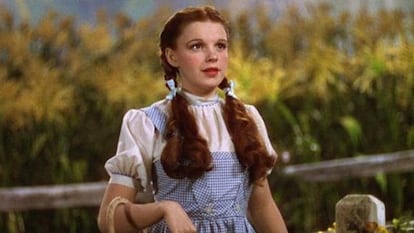Dorothy's missing dress in
The Wizard of Oz
it doesn't stop spinning.
After more than four decades lost, the garment that Judy Garland wore in the well-known 1939 film appeared in the summer of 2021 inside a garbage bag in an office at the Catholic University of Washington (USA).
Father Hartke, a priest and popular teacher there from the 1930s to the 1970s, always boasted that he had it to his credit, because a student, actress, and friend of Garland's had given it to him.
However, after Hartke's departure from the center and his death in 1986, the dress had been lost, until last year it was recovered in a cleaning.
Last April, the educational center announced that it was putting it up for auction through the Bonhams house, and that with the proceeds (it was estimated at more than one million dollars) they would finance its Theater department.
The sale would take place this Tuesday, May 24, but now a federal judge has decided to stop it.
The reason: a Wisconsin woman claims it as her property.
Judge Paul G. Gardephe of Manhattan, New York, decided to suspend the auction of the dress a day before it began because this Wisconsin woman has filed a lawsuit trying to bar the center from selling the piece.
This is revealed by
The New York Times,
which reveals the identity of the plaintiff: Barbara Ann Hartke, niece of the priest who owned the dress on her day.
More information
Dorothy's missing dress was in a garbage bag
In her lawsuit, Barbara Ann Hartke claims that she is the closest heiress to her late uncle.
He also affirms that his family knew of the existence of the dress, but that the university never notified them of the discovery and that they found out about the auction through the press, without there being "any kind of compensation for its rightful owners." according to the sentence.
In it they allege that there is no documentation to show that her uncle donated the dress to the educational center.
For their part, and logically, the lawyers of the American university disagree with Hartke and affirm that the dress is his, because the priest's wish is that it be kept at the university.
They have explained that the judge's measures are "preliminary" and that they do not imply that the dress belongs to the niece of his former teacher.
"We are waiting to announce our position, and the very clear evidence that shows the contradictory demand of Mrs. Hartke before the court in this process", they have affirmed.
The point is that none of the three protagonists and owners of the dress in time are still alive, and that there is no record of their last wishes.
The first was Judy Garland.
For her role as Dorothy, they made a couple of custom garments for her.
When it was found, thanks to the Smithsonian Museum, its authenticity was verified.
The actress died in 1969.
Judy Garland in 'The Wizard of Oz'
Neither are the two architects of this story alive.
First, Father Hartke, a huge theater fan who spread that passion not only to the school but to the entire city, making Washington a place where theater is a loved and respected art.
He died in the mid-eighties.
And neither is Mercedes McCambridge, an Oscar-winning actress in 1950, who was the link between Garland and Hartke, still alive.
She was friends with the famous performer, who gave her the dress.
And in turn, McCambridge, who passed through the university in 1972 and 1973, gave the garment to the mythomaniac Father Hartke, as evidenced by photographs from the time.

